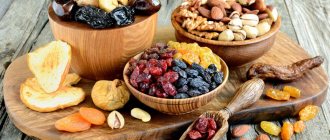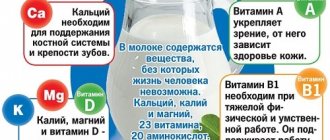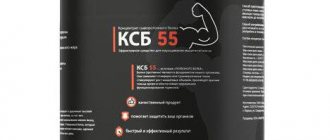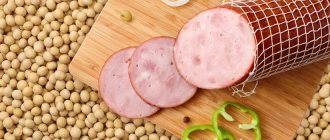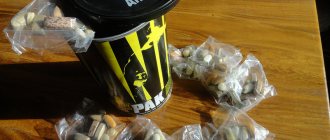Dried fruits are a natural source of fast carbohydrates, organic acids, pectins, fiber, macro- and microelements, that is, in fact, a natural energy source. The secret is that when dried, the moisture leaves the fruit, but all the beneficial substances remain. The concentration of vitamins is especially high with the natural method of drying in the sun - up to 90% compared to fresh fruit. But even with industrial production it can reach 80%.
Dried fruits and dried berries can easily replace sweets and desserts - and not just without harm to health, but with great benefits.
Medicinal properties of dried fruits
Dried fruits can become a real cure for many diseases. Here is a partial list of the benefits the most popular ones bring to the body.
Candied orange peel
effective in the treatment of asthma, bronchitis and pneumonia, have antibacterial properties, reduce the risk of developing cancer of the skin, breast and colon, improve the functioning of the gastrointestinal tract, prevent constipation, gas formation, heartburn and vomiting. They are able to improve mood and stabilize the nervous system, normalize sleep.
Raisin
has a beneficial effect on the functioning of the kidneys and cardiovascular system, improves immunity.
Figs
improves metabolism and heart function, replenishes strength and energy, and is useful for fighting tumors. Figs with warm milk helps with dry cough. A large number of vitamins and minerals make it an indispensable remedy for those recovering from illness or surgery.
Dried apricots
normalizes the functioning of the cardiovascular system, liver and pancreas, improves digestion, rids the body of toxins and waste, and reduces cholesterol levels. It is useful for brain function, improves immunity, activates the production of collagen and hyaluronic acid - prevents skin aging. Kumquat is a powerful antioxidant and source of vitamin C. It improves immunity, fights infections and parasites, removes salts and toxins, suppresses the action of fungi and kills bacteria, and helps fight infections. Kumquat is used to prevent strokes, for diseases of the nervous system, and to relieve stress and tension.
Dried apples
improve metabolism and promote the renewal of body cells, stimulate the process of hematopoiesis, improve the condition of hair and skin, provide the body with energy, reduce the risk of developing cancer, and are beneficial for the functioning of the circulatory system and heart.
Dried apricots
helps with migraines, strengthens the immune system, improves intestinal motility, removes excess fluid, relieves swelling, improves hemoglobin synthesis, and stimulates tissue energy exchange. It is a natural source of iron, carotene, potassium, magnesium and phosphorus.
Dates
increase hemoglobin, regulate the amount of glucose, improve intestinal motility, help the cardiovascular system, fight fatigue, strengthen the immune system, and can even have an antipyretic effect.
Prunes
lowers blood pressure, has choleretic and diuretic properties, strengthens the immune system and calms the nerves.
How to choose natural dried fruits without chemicals
Some manufacturers use chemicals to speed up the drying of fruits and give them a marketable appearance. And if the composition of the product must be described in detail on the original packaging, then how can you identify good dried fruits without chemicals on the market? Here are some tips:
1. Too shiny and glossy dried fruits
, most likely treated with glycerin or wax. Often these substances are used to hide traces of alkaline processing of fruits. Such dried fruits can irritate the intestinal walls and cause problems with the gastrointestinal tract.
2. Unnaturally beautiful, perfect fruits
just begging to be put on your table. But be careful: bright red dried apricots, amber-colored raisins and purple prunes may have been treated with sulfur dioxide. It helps extend the shelf life of dried fruits, prevents the appearance of mold, but kills all living things in the fruits. Therefore, when choosing between beautiful and nondescript dried fruits, give preference to the latter - most likely, they are more healthy.
3. Characteristic smell of diesel fuel or petroleum products
- a reason to refuse a purchase. Some manufacturers speed up the drying of fruits using conveyor ovens and special burners - gasoline or gas. Fruits dried in this way contain carcinogens.
4. The smell of soot and dried fruits “with smoke”
We should also be wary. This means that they were dried using a special liquid smoke. As a result of such processing, dried fruits accumulate harmful carcinogens.
Safety and harm
The most common side effects of dried fruits include:
- Dyspeptic disorders. They are caused by the abundance of dietary fiber in the composition, which, in excess volumes, disrupts the contractile activity of the smooth muscles of the intestine. They manifest themselves in the form of pain and discomfort in the abdomen, bloating and increased gas formation, nausea, and diarrhea.
- Obesity. If consumed in excess, the body is not able to “process” the incoming amount of calories, which leads to the formation of new fat deposits in the body.
- Allergic reactions. Associated with increased sensitivity of the body to individual components of dried fruit, as well as to preservatives (sulfites) used in production.
Dried fruits are safe and even preferable for pregnant women (especially in the early stages). The main thing is to carefully choose the manufacturer and observe shelf life.
It is recommended to carefully consider the inclusion of dried fruits in the diet due to the presence of health risks.
How to store dried fruits at home
After purchasing, be sure to pour the dried fruits from the bag into a glass jar or natural fabric bag - this is the most environmentally friendly way of storage. You can also store dried fruits in wooden boxes or plastic containers. To keep the benefits of fruits as long as possible, place them in a dry, dark place.
But storing dried fruits in the refrigerator is dangerous: high humidity and proximity to other products can cause mold to form. Do not cut mold from dried fruit under any circumstances - it is very dangerous for the body. Throw away any spoiled fruit immediately.
If you follow these rules, dried fruits can be stored at home from six months to a year.
How to properly wash dried fruits
Even if you are confident in the quality of dried fruits, you must wash them thoroughly before eating. You should start with soaking. Take filtered or boiled water at room temperature and pour the dried fruits in a large bowl or pan - so that the fruits float freely. During this time, they will soften a little, and all the sand and dust from them will settle to the bottom of the bowl.
This washing method will also help get rid of sulfur dioxide if you change the water in which the dried fruits are soaked 3-4 times within an hour. But it is important not to use hot: it reduces the solubility of the chemical. Pay attention to the water in which the fruits were “soaked”: if rainbow stains and a film appear on the surface, it means they were processed using gas or gasoline burners.
After soaking, be sure to rinse the dried fruits thoroughly with running water.
Admission Tips
Let's look at a few rules for healthy consumption of dried fruits:
- Daily norm. You should consume about 50-100 grams of the product at least 2-3 times a week.
- Optimal appointment time. It is better to eat dried fruits during the daytime. Taking it at night can disturb sleep, and in the morning it can cause an exacerbation of chronic diseases of the gastrointestinal tract.
- What can you combine with? Dried fruits go well with each other, as well as with nuts and honey. The practice of eating them together with yogurt or meat (prunes, dried apricots) is common.
Following simple rules for taking dried fruits allows you to fully realize your biological potential!
What dried fruits can you eat while losing weight?
Dried fruits are an excellent substitute for sweets for those who are fasting or want to lose weight. In addition, they are incredibly healthy and are not as addictive as chocolate and candy. You can easily eat a couple of fruits with tea or coffee during a snack, and you will not want more.
However, this does not mean that you can eat an unlimited amount of dried fruits per day and not be afraid of gaining weight. Moderation and common sense are necessary in everything. It is worth remembering that the calorie content of dried fruits is much higher than that of fresh fruits due to the lack of moisture. If the average calorie content of an apple is about 80 kcal, then a glass of dried apples contains 2.5 times more.
However, it is dried apples
are included in the list of dried fruits recommended for weight loss. They are rich in dietary fiber and give a feeling of fullness, and also improve metabolism. So if you're on a diet, you can stock up on apple slices for a healthy snack. It is best, of course, to use homemade garden apples. You can easily dry them yourself in the fall and then eat them all year round: if stored properly, apples can easily last for up to two years.
The unique substance bromelain in pineapple
helps quickly burn fat and prevents the appearance of atherosclerotic plaques on the walls of blood vessels, but most importantly, it does not lose its properties after heat treatment. This means that natural candied pineapple is an ideal dietary product. Moreover, they have less calories than other dried fruits. The natural fiber of pineapple helps to effectively cleanse the body of toxins, and minerals and vitamins make it a real antidepressant and natural energy booster.
Candied orange peel
also help in weight loss. They contain a lot of fiber, which cleanses the body of cholesterol, toxins and waste. Orange peel is rich in pectins, flavonoids, vitamins, minerals; it prevents the formation of subcutaneous fat. But be careful: candied oranges are still high in calories, because they are boiled in sugar syrup, so remember the benefits, but do not forget about the harm.
Whatever types of dried fruits we are talking about, keep in mind that 100 grams of fresh and 100 grams of dried fruits are not the same thing. A calorie table will help you understand how many dried fruits you can eat per day if you don’t want to gain weight.
In addition to caloric content, it is worth paying attention to the glycemic index - this is an indicator of how a product affects the level of glucose (sugar) in the blood. Most dried fruits have a low (up to 55) or medium (up to 69) glycemic index. Here is another reason why dried fruits are good for weight loss.
So, for prunes this indicator is 25, for dried apricots and pears - 30, for figs, kumquats and apples - 36. For comparison: for raisins - 65. Dates have a high glycemic index (70). However, this does not mean that dates are harmful to health. In reasonable quantities, with a balanced diet and physical activity, they will only be beneficial. And remember that 5 dried apricots are 5 apricots, and a handful of raisins is a whole branch of grapes.
Chemical composition
Apricots lose moisture during drying, so the substances contained in the pulp are concentrated in its residue. Thus, recalculated per 100 g of dry pulp, the concentration of nutrients, minerals and vitamins significantly exceeds that in fresh fruits.
Dried apricots have a rich chemical composition. It contains (per 100 g of pulp):
- carbohydrates (simple sugars, fiber, pectin, starch) - 50-55 g;
- proteins - 3 g;
- fats, including unsaturated fatty acids, phytosterols - 0.5 g;
- minerals (macro- and microelements);
- vitamins.
More than 80% of dried apricot carbohydrates consist of easily digestible carbohydrates (mono- and disaccharides).
They are what determine the high energy value of these fruits. The glycemic index of dried apricots is 30 units, so they are not recommended for consumption by those suffering from diabetes. Carbohydrates
| Name | Content per 100 g, grams |
| Mono- and disaccharides | 48,0 |
| Starch | 0,35-0,4 |
| Cellulose | 7,3 |
| Pectin | 1,3-2,1 |
There are few proteins in dried apricots (only 3 g per 100 g), but they contain all the essential amino acids necessary for humans, without which the synthesis of complete protein is impossible.
Essential amino acids
| Name | Content per 100 g, grams |
| Arginine | 0,06-0,19 |
| Valin | 0,12-0,18 |
| Histidine | 0,044-0,08 |
| Isoleucine | 0,08-0,15 |
| Leucine | 0,14-0,29 |
| Lysine | 0,12-0,34 |
| Methionine | 0,019-0,02 |
| Threonine | 0,065-0,18 |
| Tryptophan | 0,014-0,09 |
| Phenylalanine | 0,08-0,2 |
There is little fat in dried apricots (up to 0.5 g per 100 g of pulp) and at the same time they are healthy because 3/4 are represented by unsaturated fatty acids. Dried apricots also contain special fats - phytosterols, which in moderate quantities have an anticholesterolemic and antitumor effect. Their amount in 100 g of dried apricots is more than 50% of the daily requirement for a person.
The nutritional and energy-important compounds in dried apricots are harmoniously supplemented with vitamins and minerals.
Vitamins and vitamin-like compounds
| Name | Content per 100 g of pulp, milligrams |
| Provitamin A (carotene) | 3,5-4,5 |
| Carotenoids lycopene | 0,2 |
| Carotenoids lutein + zeaxanthin | 0,052-0,082 |
| Vitamin B1 (thiamine) | 0,015-0,1 |
| Vitamin B2 (riboflavin) | 0,058-0,074 |
| Vitamin B4 (choline) | 13,9 |
| Vitamin B5 | 0,52 |
| Vitamin B6 | 0,14-0,17 |
| Vitamin B7 (biotin) | 0,001 |
| Vitamin B9 (folic acid) | 0,01-0,014 |
| Vitamin PP (nicotinic acid) | 2,6-3,9 |
| Vitamin C (ascorbic acid) | 1,0-4,0 |
| Vitamin E (tocopherol) | 4,3-5,5 |
| Vitamin K (phylloquinone) | 0,031 |
In terms of potassium concentration in the pulp, dried apricots are the leader among plant products.
This dried fruit is also a source of many other macro- and microelements. Moreover, some of them are contained in dried apricots in the daily amount required for the human body, for example, silicon, boron, chromium. Mineral composition
| Name | Content per 100 g of pulp, milligrams |
| Potassium | 980,0-1160,0 |
| Phosphorus | 54,2-77,5 |
| Sulfur | 50,0 |
| Silicon | 44,0 |
| Calcium | 38,0-90,0 |
| Magnesium | 35,0-48,0 |
| Iron | 2,7-6,0 |
| Aluminum | 0,860 |
| Manganese | 0,173-0,282 |
| Bor | 0,27 |
| Copper | 0,27 |
| Zinc | 0,2-0,39 |
| Chromium | 0,059-0,1 |
| Iodine | 0,0034 |
| Selenium | 0,0022 |
The plant fiber of apricot fruits is capable of accumulating the radionuclide strontium, therefore apricots growing in radiation-affected regions are strictly prohibited for consumption or harvesting, including in the form of dried apricots.
The calorie content of these dried fruits is high and amounts to 220-240 kcal per 100 g (depending on the type of apricots used). Such a high calorie content is provided mainly by carbohydrates, since their amount in 100 g of dried apricots is up to 55 g.
